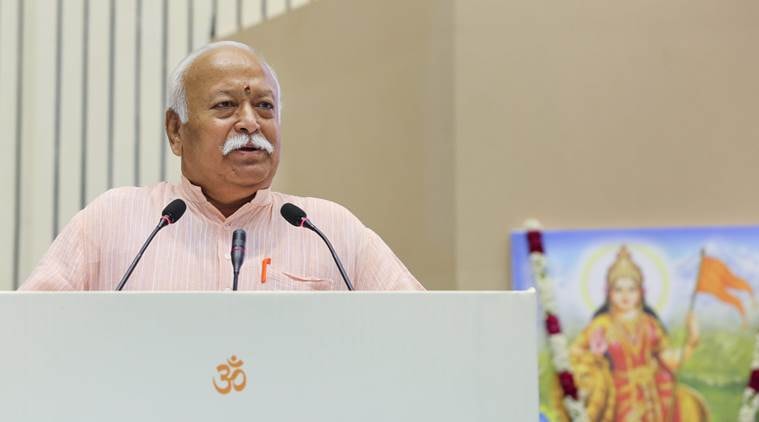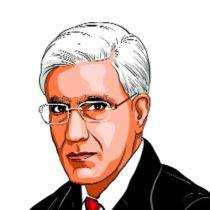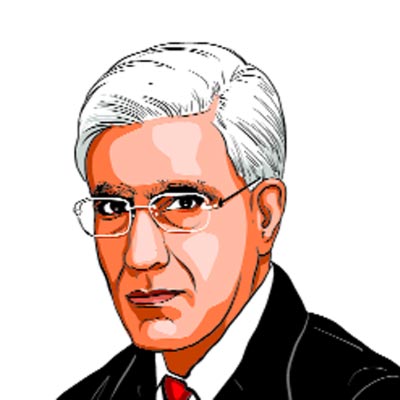Has the RSS ground shifted?
Mohan Bhagwat’s views about the Constitution, Muslims are radically different from that of his predecessor, K S Sudarshan.

RSS chief Mohan Bhagwat speaks on the 2nd day at the event titled ‘Future of Bharat: An RSS perspective’, in New Delhi, Tuesday, Sept 18, 2018. (PTI Photo/File)
The recent lecture series by the Sarsanghchalak of the RSS, Mohan Bhagwat, which was splashed across front pages nationwide, forcefully raises the question: Is this organisation under its present chief changing its position on critical matters such as the Constitution, the concept of Hindu Rashtra and the treatment of minorities? And if the answer is yes, can we accept what Bhagwat has said at face value or do we need proof that he also means to practice what he preaches?
An interview I did with his predecessor, K S Sudarshan, in August 2000 for the BBC programme HARDtalk India helps answer the first question both substantially and meaningfully. The difference between the viewpoints expressed by the two men is not just clear but stark.
Let’s start with the RSS’s attitude to the Indian Constitution. Earlier this week, Bhagwat said: “We respect the Indian Constitution. A lot of thought has gone into making it. It was done through consensus. The Sangh has never gone against the Constitution.” The last sentence is, perhaps, the most critical of all.
In contrast, Sudarshan refused to accept the Constitution as it stands. He believed it needed to be “reviewed completely” to reflect the country’s Hindu ethos. Let me quote from that interview to accurately explain his position:
Karan Thapar: Do you accept the Constitution as it is?
Sudarshan: No, what we say is this Constitution doesn’t reflect the basic ethos of this nation.
KT: Mr Golwalkar, one of your predecessors, in his book Bunch of Thoughts said: “There is nothing in the Constitution which we call our own”.
KSS: True so. The whole Constitution is based on the Government of India Act 1935. Some of the things from other constitutions have been added to it. It’s not an evolved one.
KT: Are you saying it’s alien to India’s character and thinking?
KSS: True so. It doesn’t reflect it… our Constitution should reflect our national ethos.
KT: And at the moment you are saying it doesn’t?
KSS: Definitely.
For some, Bhagwat’s view about minorities and, in particular, Muslims was the most striking shift of all. Far from seeing them as alien or even different, Bhagwat said that Muslims — but, I presume, he means all minorities — are intrinsic to India and without them “the concept of Hindutva will cease to exist”. His exact words were: “Hindu Rashtra does not mean it has no place for Muslims. The day it’s said that Muslims are unwanted here, the concept of Hindutva will cease to exist.” He could not have been more explicit and forthright.
Sudarshan’s view about minorities was very different. For a start, he refused to accept the concept of minority. Consequently, he did not believe the Constitution needed to grant them special rights. Once again, let me quote from the BBC HARDtalk India interview:
KT: If (part of) the basic structure (of the Constitution) is special rights for minorities to give them a sense of security (would you accept it)?
KSS: We don’t accept the concept of minority at all.
KT: So they don’t need special rights?
KSS: True so.
Elaborating on his views, Sudarshan told the BBC that the Constitution needed to be “reviewed completely”. He did not feel bound by the way it was created 70 years ago. What he believed necessary was a review to reflect the essential and unchangeable Hindu character of the people. Again, let me quote from the interview:
KSS: We should evolve our own Constitution. Constitution cannot be imposed on us. Since 1909 (the Minto-Morley reforms) the whole Constitution has been imposed on us. It has not evolved. It must evolve.
KT: You want a thorough review of the Constitution to reflect India’s actual Hindu character?
KSS: Not only myself, even Dr Ambedkar said the same thing in his concluding speech over the Constitution. He said each generation is a nation in itself. It can bind itself as the will of the majority to a particular legal system but it cannot bind the coming generation.
KT: And do you feel bound today by the Constitution that was created 50 years ago?
KSS: What I mean to say is it needs utter review. It must be reviewed completely.
KT: And the review must happen to reflect what you call the essential unchangeable Hindu character of the people?
KSS: Yes.
Clearly, Bhagwat’s lecture series, where he readily repeated the Preamble of the Constitution including its commitment to secularism and socialism, is a significant shift away from his immediate predecessor’s thinking. To be honest, it feels like a U-turn.
In turn, that raises the question can we accept what Bhagwat said at face value or do we need proof that he means it? Even if the BJP is in accord with his views what about the Bajrang Dal and the Vishwa Hindu Parishad? And what about the many BJP MPs and MLAs who, routinely and repeatedly, say hateful things about Muslims and are rarely admonished and only infrequently apologise? Indeed, what about the cow lynchings or low-intensity communal trouble carried out by RSS supporters or even members? And what about the fact that not a single Muslim candidate was fielded by the BJP in UP in 2017, despite the fact that 19 per cent of the state’s population is Muslim, or in any of the state elections held in Gujarat since 1989? In fact, Bhagwat himself is not averse to making inflammatory statements. In 2015, when Mohammad Akhlaq was lynched on suspicion of consumption and storing beef, he’s reported to have said: “The Vedas order the killing of the sinner who kills a cow.”
I would conclude it’s hard to dispute the view we need change on all these fronts before Bhagwat’s softer and emollient speeches can be accepted as proof that the RSS has changed its views. The recent RSS lecture series is just a precursor or herald of what we hope will follow. However, this pudding is still to be eaten!
The writer is president, Infotainment Television
For all the latest Opinion News, download Indian Express App
More From Karan Thapar
- A moral leadership deficitThe response to Kathua and Unnao highlights an absence...
- Stooping to coverWatchdog journalism is being replaced by guard dog journalism. Media is deferential to authority, intolerant of contrarian views...
- A meeting, a conspiracyBJP’s fear and foreboding about the Gujarat outcome leads to a bizarre theory ..












.png)



























No hay comentarios:
Publicar un comentario